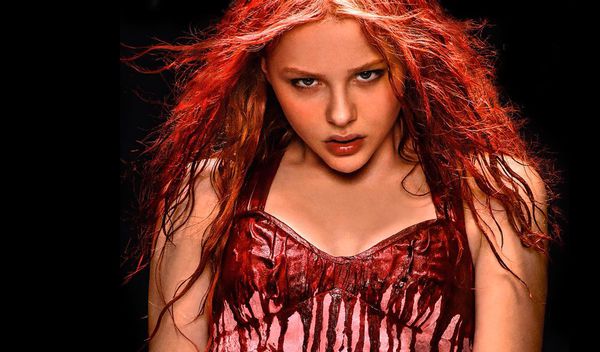Eye For Film >> Movies >> Carrie (2013) Film Review
Carrie
Reviewed by: David Graham

After a curiously quiet Halloween for horror, another yawn-inducing remake is dumped unceremoniously into cinemas having done precisely nothing Stateside. At least this re-imagining of Brian De Palma's evergreen classic has the good grace to plumb Nic Cage's Wicker Man levels of Youtube-worthy unintentional hilarity at points, but sadly it's too boring too even be that bad. The odds looked good, with a strong feminine director in Kimberly Pierce and a potentially barnstorming face-off between Chloe Moretz and Julianne Moore. Frustratingly, when it works it actually gets the spine tingling and the blood pumping, but for the most part it's like an after-school TV movie adaptation of the original. And there's already been one of those.
Carrie White is one of life's misfits, ridiculed at school by her prissy peers and shamed into devotion by her insanely religious mother. When the naive teen suffers a shocking embarrassment at the hands of her classmates, her fear and pain triggers an elementary power hitherto unknown. As she investigates her uncanny abilities, the sympathetic, regretful Sue convinces her boyfriend Tommy to ask Carrie to the upcoming prom, a noble gesture that could backfire horrifically if queen bitch Chris' plans for revenge come to fruition.

There are several nice nods to what's gone before - referencing the warped sense of humor in King's book with the 'Blood Sport' pun, as well as a reprise of the cringe-worthiness of some of De Palma's camp classic scenes - and the sprinkling of new ideas (the birth imagery, the social media critique) are actually kept effectively subtle while being woven into the narrative at frequent points in visually interesting ways.
There's also a sense of balance neatly carried over from King's writing that succeeds in portraying the characters in a more even-handed way than even the original - we're given a glimpse of what's made lead bully Chris such a terror through her yuppie father, while the callous headmaster who can't get Carrie's name right is toned down from before. Likewise, the shrieking violin stabs of yore - laughable even in their day to some - have been replaced with a predictable but sparingly-used sonic rumbling, and Carrie's growing into herself via her powers is spun in a more positive light, which actually gives her character a greater sense of light and shade.
Moretz sells it all pretty well, but she's fundamentally miscast: everything from her unrealistic strawberry-blonde makeover to her actual age (she's obviously too young to be going to the prom already) smacks of stunt casting. It's easy to forget that Sissy Spacek was 26 years old in the original, but Moretz's awkward tics here feel just that - awkward. She's better in the sweeter moments, and truly shines come the night of the dance, but her transformation into a vengeful wraith - while becoming deeper through her nicely emphasised upset over Tommy's fate - feels more like a rerun of hokey Eighties rip-off Evilspeak than the real thing. While the build-up raises hackles in anticipation, the pay-off isn't even as brutal as De Palma's finale.
It's a crying shame the screenwriters couldn't squeeze more of the book's detail into the brief run-time, but when they do it has a brilliantly intensifying effect. In particular, Mother White becomes even more of an unnatural figure through some gruelingly unpleasant habits, which provoke mirth at first - especially during a woefully-edited scene of quite literal bible-bashing - but soon develop to become toe-curling disturbing. Moore's attempts to dial her mania down - as if anyone could do God-freak better than Piper Laurie - work to the character's advantage too, with an initially throwaway-seeming pre-credit sequence reverberating back around the story in ways that make her a more human and plausibly tragic antagonist.
Pierce takes a similar direction behind the camera: for the most part her approach is surprisingly lifeless and the aforementioned editing does it no favours, but this restraint helps her coax some emotive moments from her ensemble, showing she hasn't altogether lost her Boys Don't Cry flair, and she stresses the dangerous conflict between the characters' altruism and selfishness to a greater degree. When she does cut a little more loose towards the end, she still can't hold a (wildly pirouetting) candle to De Palma's showboating, and she never manages to be remotely creepy, but she does use the effects budget for a couple of memorably nasty comeuppances, even if the hackneyed use of age-old slow-motion and instant replay angle-shifting crumble the impact of one crucial moment.
Like with the new Evil Dead, your reverence for the 1976 version will of course taint how you react. Without the murky melodrama of the original, this new Carrie is reduced to the sort of thing you could actually show in high school; to many kids who've never heard of De Palma or even King it will be a satisfying and absorbing tale, with a lingering cautionary streak. Even then though, the recent Chronicle has stolen much of its thunder, and as horror it falls utterly flat in the end.
Did it need to be made? No. Is it worth watching? Kinda. Whether you bother or not, whether you're young or old, at least it will send more people back to its inspiration.
Reviewed on: 30 Nov 2013

















